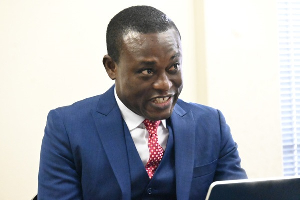The top hierarchy of the Ghana Police Force is obviously embarrassed by the spate of armed robberies that have hit Accra and its environs, as well as other urban areas, in recent days.
This embarrassment has led to a minor change in command at the top of the police service. But this change has been made somewhat comical by the fact that one of the top people who has just been reassigned, appears to have been personally involved – latterly – in the arrest of armed robbers allegedly caught with “sophisticated weapons”.
Be that as it may, such a minor reshuffle can't possibly solve the current upsurge in crime in the country. I hesitate to discuss this issue because the Ghana Police Force has turned out, in my experience, to be one of the most resolutely deaf institutions in the country – as far as respect for public opinion is concerned.
I need to explain how I came by that damning viewpoint. In November 2010, a 72-year-old woman, Madam Amma Hemaa, was set upon and horrifically burned alive at Tema, by a sadistic mob, who mistook her “odd” behaviour for witchcraft! The police initially charged some people, took them to court, and efficiently outlined the case against them. But since then, nothing has been heard about the case.
I have personally written numerous articles over the past eight years asking the police to let us know what had happened to the case of the alleged murderers of the old woman. [See, for instance]
or the old woman's behaviour before she was killed clearly showed symptoms associated with dementia or Alzheimer's disease. So, in refusing to prosecute the case to its logical conclusion, the police had failed in one of their tasks – educating the public to understand what constitutes a crime. When members of the public know what a crime is and what is not, they are more likely to be deterred from committing stupid crimes, such as burning sick, old people for witchcraft.
So, had the murderers been cross-examined in court; had expert evidence been adduced to provide a vivid description of what can happen to people who suffer from dementia or Alzheimer's, and had a judge come to a judgement which he would have read in open court, the public would have been educated to recognise the crucially important fact that “odd” behaviour in older people can have a physical – as against a “spiritual” – cause. Just as a headache, stomachache or boil can be treated in the physical realm with medication, and not only with so-called “holy water” supplied by a person falsely representing himself as a “prophet”.
Equally, if the Ghana police service were a listening organisation, it would have saved itself much embarrassment in its handling of galamsey cases. It wants our President and his Cabinet to give it the “tools” so that it can “do the job”. But when it has an opportunity to demonstrate that it can “do the job”, what does it normally do?
Take just one example: it's only in the past week [end-February 2018] that the Chinese “Galamsey Queen”, Ayesha Huang, was given more serious charges than the minor immigration misdemeanours she had initially been charged with. In fact, galamsey cases have been so poorly prosecuted that some judges and magistrates have been treating the cases with kid gloves. They are now under justifiable attack, for there is an incessant outcry against the wanton manner in which our rivers and water-bodies, as well as our food and cocoa farms, are being ruthlessly destroyed by conscienceless galamsey operators, in their search for gold.
The public at large has begun to accept -- cynically -- that since the judges and magistrates are not with the campaign to end galamsey, then they are against it. But should we present a divided front, when our whole society needs to be mobilised to deter our own people and their foreign collaborators from laying waste to our rivers, streams and water-bodies?
Another example: it was reported recently that a district chief executive and a district assembly had collected 700,000 Ghana Cedis from a group of Chinese galamseyers and released to them, 12 excavators and bulldozers that had been seized from the Chinese miners at a galamsey site. Has the Ghana police (CID) interrogated the district chief executive and his assembly members? Mustn't the CID find out where they got the power to adjudicate over galamsey cases (without the participation of the police) and impose a “penalty” on galamseyers (outside a court!) payment of which [700,000 Ghana Cedis!] entitled them to release the excavators to the galamseyers? Are the police going to pass this case of brazen corruption to the Special Prosecutor's office?
With such lapses occurring in the work of the police service, we would be justified in holding our peace with regard to how the detection and deterring of armed robberies might be conducted. But who knows? Maybe it is only a few police officers who have closed their ears to expressions of concern about the performance of the police by members of the public.
Therefore, in the belief that there might be willing ears in the police service, here, for what they are worth, are a few points to ponder. One: police communications must be completely revamped. Advantage should be taken of the tremendous advances that have been made in digital and mobile telecommunications technology to install systems which can make calls to the police information room (for instance) to be heard synchronously by every police car within the environs of the metropolis, as well as every police station nearby. Putting colleagues on the alert is one of the most elementary aspects of ensuring effectiveness by the police.
Equally important, such sophisticated equipment must be installed in the central information centres as makes it IMPOSSIBLE for a call from the public not to get through to the police and be recorded if there is no-one available to answer the call in real time. In the US, the authorities are still poring over warnings that the public had given the police about the state of mind of the student who shot and killed 17 innocent students in Florida recently. The information was there, provided by the technology, and had the police been efficient enough to utilise it, those poor kids would be alive today. We must make sure that our police service too always possesses the means of -- at the very least -- receiving information from the public.
(To be Continued)
Opinions of Monday, 5 March 2018
Columnist: Cameron Duodu















